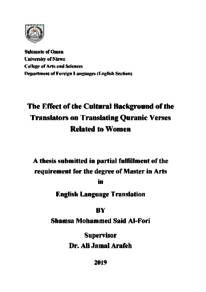Document
The effect of the cultural background of the translators on translating Quranic verses related to women.
Identifier
AL-Foriayh, Shamsa bint Mohammed (2019). The effect of the cultural background of the translators on translating Quranic verses related to women (Master thesis, University of Nizwa, Nizwa, Oman).
Publisher
University of Nizwa.
Gregorian
2019
Language
English
English abstract
English translations of the Quran are dated back to the twelfth century. The main translators working on the Quran projects were not happy the translation and described their "participation as a 'digression' from the scientific translations" (Pym, 1998:130).
This study aims at comparing seven English translations which are done by translators from different cultural backgrounds. It also investigates the effect of the cultural background of the translators on their translations of verses related to women by adopting Newmark's cultural framework. The second objective of the study is to examine areas of differences between the seven selected translations. It explores if these differences are attributed to the extra-textual factors of the translation adopted from Nord's model of text analysis (2005).
The sample of this study consists of thirty verses related to women from various Quranic Chapters. The data is collected from islamawakened.com and the books of the seven translators. The study adopts Ibn-Katheer's interpretation as a reference.
The study adopts a cultural framework to examine the effect of the cultural background of the translators on their translations of verses related to women. It also applies Nord's functional model of text analysis to investigate if the extra-textual factors of the translation have an influence on the translation of verses by the seven translators.
The study reveals that there are different effects of the cultural background of the translators on their translations of verses related to women. These differences are caused by the linguistic culture, social culture and religious culture of the translators. Another main finding of the study is that the translations are influenced by the extra-textual factors of Nord's model. These factors are time and place of production, sender's intention, the target readers and purpose of the translation.
Finally, the study recommends that the translator of the Quran should have a thorough knowledge of Arabic language in general and especially cultural and Islamic terms, and the translator has to refer to exegeses' books to produce accurate renditions of meaning.
Member of
Resource URL
Category
Theses and Dissertations

